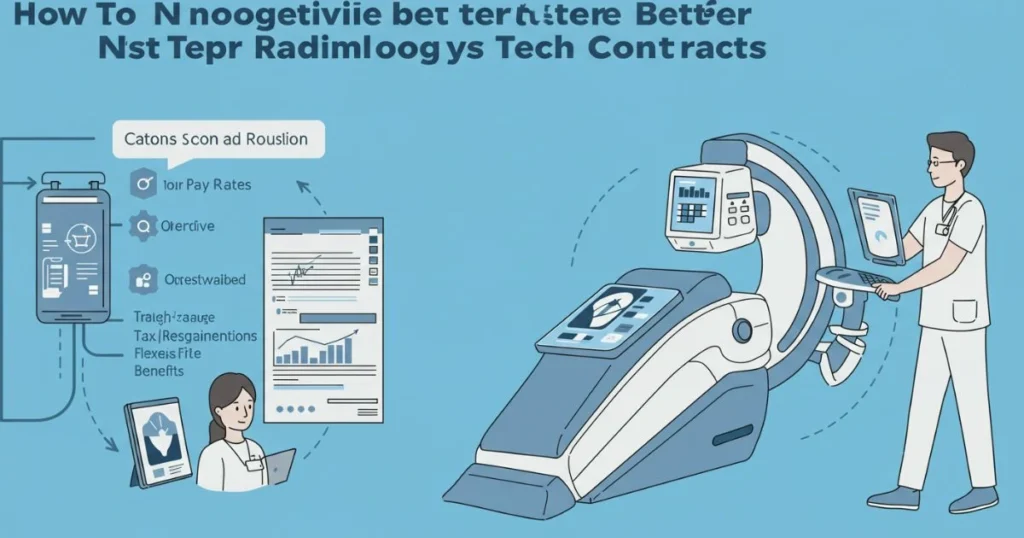Travel Radiology Tech Salary: Earnings & Benefits Explained
Travel radiology tech salaries are growing as more healthcare places in the U.S. look for flexible workers. This job offers good pay, benefits, and the chance to work in different places. It’s a great choice for those wanting to earn more and gain experience in various medical settings.
Hospitals and imaging centers all over the country need more staff. This means there’s a big demand for certified radiology technologists for short-term jobs. Your salary can change based on where you work and how much experience you have. Many jobs come with extra benefits like housing help, health insurance, and tax-free money.
To get these jobs, you need an ARRT certification and a state license. Having some experience in the field is also a plus.
Key Takeaways
- Travel radiology tech salary averages exceed permanent roles by 15-30%.
- Compensation includes housing stipends, healthcare coverage, and travel reimbursements.
- High demand exists due to nationwide healthcare staffing shortages.
- Qualifications require ARRT certification and state-specific licenses.
- Flexibility and higher pay make this path ideal for career growth.
Understanding the Travel Radiology Tech Career Path

Exploring a career as a travel radiology tech opens doors to dynamic opportunities. Let’s break down what this role involves and why it appeals to professionals seeking growth.
What Travel Radiology Techs Do
As a travel radiology tech, you’ll perform imaging procedures like X-rays, CT scans, and MRIs in rotating facilities. Daily tasks include operating advanced equipment, preparing patients, and ensuring safety protocols. For example, you might work in hospitals one quarter and imaging centers the next, gaining diverse experience. Your skills directly impact diagnostic accuracy, making your role vital to patient care.
Why Professionals Choose Travel Assignments
Many choose this path for flexibility. Unlike permanent roles, travel assignments let you explore cities while earning competitive travel radiology tech salary rates. The average contract lasts 13 weeks, offering breaks between assignments. Some cite career growth: rotating locations exposes you to new technologies and workflows.
“The variety keeps my skills sharp and my career exciting,” says one tech with 10+ assignments.
Others prioritize higher pay compared to permanent roles or even specialties liketravel ultrasound tech salary, which can differ based on demand and location.
Required Qualifications and Certifications
To qualify, you must hold an ARRT certification and state license. Agencies prefer experience in modalities like CT or MRI—specialized skills can boost your travel radiology tech salary. For example, earning an ultrasound certification opens doors to roles where travel ultrasound tech salary premiums apply. Regularly renewing credentials ensures eligibility for high-demand assignments. Your portfolio of certifications makes you a sought-after candidate, even in competitive markets.
Travel Radiology Tech Salary: National Averages and Ranges

Understanding the travel radiology tech salary landscape is key to planning your career. Look into current trends and pay rates across the U.S.
Baseline Salary Expectations
Starting out, techs can make $1,200–$2,500 weekly. More experienced ones can earn $2,000–$3,000 weekly. This means they can make $62,000–$156,000 in a year. Getting certified or specializing in advanced imaging can lead to higher pay.
- Entry-level: $62,000–$85,000 annually
- Experienced: $90,000–$156,000 annually
Regional Salary Variations Across the US
Where you work affects your pay. Places like California, Massachusetts, New York, and Washington pay more. This is because of high demand and living costs. For instance:
- California: $2,200–$3,200 weekly
- Massachusetts: $2,100–$2,800 weekly
“Travel radiology tech salary disparities reflect regional healthcare demands. Urban centers pay more than rural areas.” — Bureau of Labor Statistics
Comparing Travel vs. Permanent Radiology Tech Pay
Travel roles usually pay 20–40% more than permanent jobs. This is because of extra benefits like housing stipends and sign-on bonuses. Here’s a comparison:
- Travel pay: Includes housing stipends, per diems, and sign-on bonuses
- Permanent pay: Typically lacks travel-specific perks but offers job stability
Full-time employees make $60,000–$80,000 a year. This is less than what travel roles offer when you consider all the benefits.
Key Factors That Influence Your Earning Potential
Your travel radiology tech salary is not just about your job title. Several factors can affect how much you earn:
- Experience Level: Starting out, you might earn $30-$40 an hour with 2 years of experience. After 5 years, you could ask for 20% more. And after a decade, you could earn $50+ an hour.
- Specialized Skills: Getting certified in areas like MRI, CT, or interventional radiology can increase your pay by 10–30%. Employers look for techs with advanced training in these high-demand fields.
- Crisis Pay Rates: During shortages or emergencies, crisis pay rates kick in. Some jobs offer double the hourly rate during these times.
- Location Impact: Rural hospitals often pay more to attract staff. Working in underserved areas can add $5-$10 an hour compared to city jobs.
- Flexibility: Working night shifts, holidays, or remotely can get you premium pay. Agencies reward techs who are flexible with their hours.
By making smart choices in training, location, and availability, you can shape your travel radiology tech salary. Focus on getting certifications, taking on challenging assignments, and being open to less popular shifts. This can help increase your earnings.
Breaking Down the Complete Compensation Package
Your travel radiology tech salary is more than just an hourly rate. Agencies offer benefits that increase your earnings and lower taxes. Knowing these benefits helps you make the most of your job offers.
Housing Stipends and Tax-Free Benefits
Agencies give out weekly housing stipends of $500–$2,000+ that don’t count as taxable income. You need a permanent home to qualify. Companies like TeamHealth and AMN Healthcare offer these stipends, saving you money on taxes.
Health Insurance and Retirement Options
“Comprehensive medical, dental, and vision plans are standard,” states a 2023 MedTravelers report. “Retirement accounts often include employer matches of 3–6%.” Check if agencies like Jackson Healthcare Group cover premiums or offer 401(k) contributions. These benefits reduce out-of-pocket costs while securing long-term financial stability.
Travel Reimbursements and Per Diems
- Relocation: Agencies like Cross Country Nurses reimburse moving costs for assignments over 13 weeks.
- Meal and travel: Per diems range from $40–$75 daily for meals, covering food expenses during assignments.
Completion Bonuses and Incentives
Finish a 13-week contract and earn bonuses up to $3,000. Referral programs can add $1,000–$5,000 per hire. Some agencies like ProTravel Medical offer extension bonuses of $500–$1,000 for staying past initial terms.
When calculating your travel radiology tech salary, remember to include stipends, bonuses, and tax savings. A $35/hour base rate plus a $1,000 weekly stipend and $200 monthly health savings could net $1,000+ extra monthly. This way, you can earn $80k–$100k annually through these benefits.
How to Negotiate Better Travel Radiology Tech Contracts

Negotiating your travel radiology tech contracts can really boost your earnings. Learning to ask for better terms helps you make the most of your travel radiology tech salary. Here’s how to negotiate with confidence.
Understanding Agency Markups and Take-Home Pay
Staffing agencies usually add 20–30% to your pay. Knowing this helps you figure out your fair share. Look up average rates in your area to know your worth. For example, if a facility pays $80/hour, aim for a take-home rate of $56–64/hour after markup.
This way, you get fairly paid for your skills.
Contract Terms Worth Negotiating
Look at clauses that affect your money and work life. Key areas to talk about include:
- Housing stipends: Ask for more in expensive areas.
- Guaranteed hours: Get a 40-hour minimum to avoid pay gaps.
- Overtime rates: Push for time-and-a-half for extra shifts.
- Cancellation policies
- Extension bonuses: Ask for extra pay for staying past your contract.
Timing Your Negotiations for Maximum Leverage
Use peak seasons like summer or holidays to your advantage. Facilities often pay more during these times. Also, showing offers from other agencies can strengthen your position.
Use urgency to your advantage—recruiters may give in to fill roles fast. Timing your negotiations right can add thousands to your travel radiology tech salary over time.
Comparing Travel Healthcare Salaries Across Specialties
Choosing the right travel healthcare role is about finding a good balance. It’s about earning well and using your skills. Let’s look at how travel radiology tech pay stacks up against three other specialties.
Travel Ultrasound Tech Salary Comparisons
Ultrasound techs often earn 5–15% more than radiology techs. This is because they have specialized training. Cardiac and vascular sonographers can earn up to $2,500 a week.
In places like Texas or Florida, obstetric ultrasound roles pay well during maternity seasons. Having certifications like RDCS (Registered Diagnostic Cardiac Sonographer) can also increase your travel ultrasound tech salary.
Travel Pharmacy Tech Jobs and Compensation
- Travel pharmacy tech jobs usually pay 10–20% less than radiology roles. But, they offer more stability.
- Hospital jobs pay 15% more than retail clinics. This is because they handle more complex medications.
- Certified pharmacy technicians (CPhT) start with higher rates than non-certified ones.
Surgical Tech Travel Positions and Their Earning Potential
Surgical tech travel positions are in high demand during staffing shortages. Some agencies offer $1,800–$2,200 a week. Roles in the operating room that need advanced certifications like CST (Certified Surgical Technologist) can get crisis bonuses.
A 2023 survey by AMN Healthcare shows trauma-specialized surgical techs earn 25% more than generalists in big cities.
“Certifications like the CST or RDMS aren’t just credentials—they’re direct pathways to higher hourly rates in travel roles,” says Sarah Lee, a staffing recruiter at Med Travelers.
Compare these numbers to your current skills. If you’re certified in multiple areas, you might get dual certifications in radiology and ultrasound. This could help you earn more in travel ultrasound tech salary roles. Look at all your options to find the best-paying niche for you.
Proven Strategies to Maximize Your Travel Radiology Income
To boost your travel radiology tech salary, start by building specialized skills. Getting certifications in CT, MRI, or mammography makes you more versatile. This lets you ask for higher pay. Agencies look for techs who can handle different modalities.
- Time assignments to align with high-demand seasons—winter in northern states or summer in tourist areas—where hospitals pay premiums for temporary staff.
- Accept urgent crisis assignments. Facilities facing sudden shortages may offer rates 50-100% higher than standard travel radiology tech salary benchmarks.
- Minimize downtime by planning back-to-back contracts. Stay in contact with recruiters to secure new roles before current assignments end.
“Techs who shop around for offers and compare benefits often secure better hourly rates. Don’t settle for the first proposal,” advises a leading travel staffing firm.
Look into facilities in remote or underserved areas. These places often pay more to attract talent. Surgical tech travel jobs in unique settings like trauma centers or pediatric hospitals also offer high pay. But radiology techs can use the same tactics to negotiate better pay based on location.
Lastly, keep an eye on facility-specific challenges like staffing crunches or equipment upgrades. These situations often come with bonuses or stipends. By using these strategies, many radiology techs see their annual earnings jump by 20% or more.
Conclusion: Is a Travel Radiology Tech Career Right for You?
Thinking about a career as a travel radiology tech? It’s a choice between money and lifestyle. You might earn 20-40% more than a regular job, thanks to higher pay and perks like housing and bonuses. But, you’ll have to move often and get used to new places.
Some people love this job for its flexibility or to make more money fast. It’s a chance to try different healthcare settings before aiming for leadership roles. Others just want to save money without worrying about long-term jobs.
Before diving in, look for good salary deals and check your certifications, like ARRT. Get ready for your job by understanding your contract and joining groups like the ASRT. This career is exciting but requires you to be flexible. Think if the extra money and changing work places fit your goals and lifestyle.
FAQ
There are no reviews yet. Be the first one to write one.






